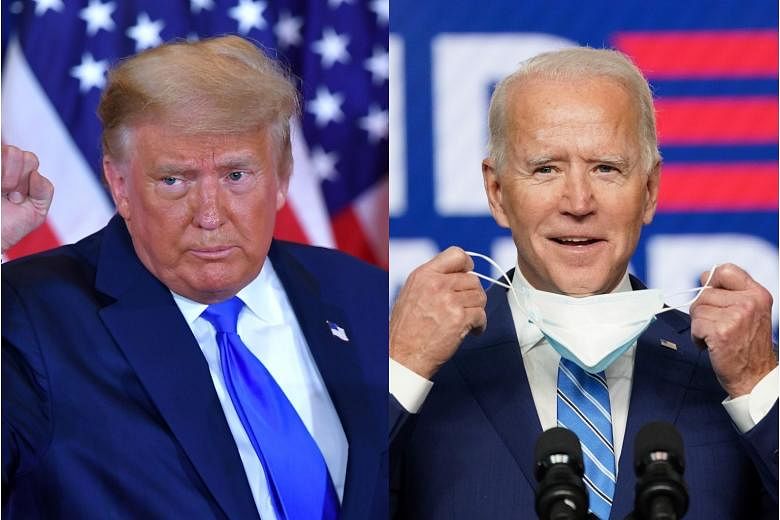WASHINGTON • As United States President Donald Trump and his allies flooded social media with false claims of victory and unsupported allegations of voter fraud, disinformation researchers and social media companies are warning about a proliferation of disinformation.
False and unfounded claims on social media have put to the test Silicon Valley's much-touted ability to handle election misinformation.
As ballots were still being counted on Wednesday, Mr Trump said he had won, although he had not. He also claimed that Democrats were trying to "steal" the election.
Twitter hid the posts within minutes. In addition to adding a warning label, it limited likes and comments, and if users wanted to share it, they had to add their own commentary.
It also tagged statements by Mr Trump's son Eric and White House Press Secretary Kayleigh McEnany that falsely claimed victory in Pennsylvania.
In a tweet, Mr Trump said: "We hereby claim the State of Michigan if, in fact, there was a large number of secretly dumped ballots as has been widely reported!"
The post was marked as misleading by Twitter.
Similarly, Twitter had also applied a label to a post by Mr Ben Wikler, head of the Democratic Party of Wisconsin, which asserted prematurely that Mr Joe Biden had won in the state.
"Some votes may still need to be counted," Twitter's label read.
But it is not clear whether the disclaimers and fact-checks, which often occur well after posts have been shared many times, are curbing the spread of baseless claims.
"Many are still glued to social media streams hoping to glean any new information, which makes them likely to encounter misinformation," said Dr Joan Donovan, the research director at Harvard University's Shorenstein Centre.
Unsubstantiated allegations that ballots for Mr Trump were not counted because voters used Sharpie pens, dubbed "Sharpiegate" on social media, were labelled as false on Facebook but shared hundreds of thousands of times. The rumours prompted more than 100 Trump supporters, urged on by right-wing Twitter figures, to gather in Phoenix on Wednesday and demand to be let into an election building where votes were being counted.
Even if the disclaimers are curbing the spread of misinformation on the platforms, they have not stopped other media from amplifying Mr Trump's comments or his claims from hopping from one platform to another.
On Fox News, Mr Trump's tweets were read out verbatim on Wednesday, sometimes without caveats about their veracity.
But even more worrisome than posts sharing misleading information is the erosion of the public's trust in the democratic process beyond this specific election, said Ms Nina Jankowicz, a disinformation analyst at the Wilson Centre, a nonpartisan think-tank.
"In countries I have worked in where there is a history - and evidence - of voter fraud, citizens' distrust in the democratic process lingers long even after several cycles of clean, well-run elections," Ms Jankowicz said.
BLOOMBERG, NYTIMES, REUTERS
For live updates and results, follow our US election live coverage.

